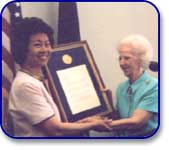|
 Printer-Friendly Version Printer-Friendly Version
U.S. Secretary of Labor Elaine L. Chao
Remarks at
Ceremony with Mrs. Clara Harding
Paducah, Kentucky
August 9,
2001
 Good morning and thank all of you for
coming. Good morning and thank all of you for
coming.
I know Congressman Ed Whitfield wanted to be here today,
and I appreciate the presence of Michael Pape, his District Director. That was
a lovely letter you read, Michael. We’re also pleased to have with us T.C.
Freeman from Senator Jim Bunning’s office.
It’s wonderful to see David Fuller, President of the
PACE local here with us, as well as the PACE local steward, Leon Owens.
I also want to thank someone I happen to know pretty
well—for his warm introduction: my husband, Senator Mitch McConnell.
I’m lucky to be married to him, don’t you think?
Today we celebrate something more than just the successful
beginning of a new program: we celebrate the triumph of the human
spirit—the ability to overcome difficulty and even tragedy to bring about
something that is of great value.
One of the most moving aspects of being the Secretary of
Labor is that I meet people, in all walks of life, who transform their
hardships and challenges into victories—not just for themselves, but for
others as well.
There is no more poignant example of how people can
transform their trials into triumphs than the tender story of Joe and Clara
Harding.
Joe and Clara met as teenagers in Bolivar, Tennessee in
1939. I’ve been told that she was out with someone else when Joe asked her
for a date. As Clara puts it, “He was the best-looking man I had ever
seen.”
They got married a year later, had two children, and twelve
years later Joe started work at the Paducah Gaseous Diffusion Plant, on the
front lines of America’s atomic age.
Just two years later, Joe started showing signs of toxic
exposure to radiation. As he grew more and more ill, he raised concerns about
radiation levels, all of which went unheeded. After leaving the plant in 1971,
his disability claim was denied; and nine years later, Joe Harding passed away
in Clara’s arms.
However, that’s not the end of their story—and
we are all thankful for that.
Before his death, Joe started writing government officials
about the dangers of radiation at the Paducah plant. Clara continued that work
after Joe died, focusing public attention on illnesses and deaths at the plant,
and insisting that workers be fairly compensated.
It wasn’t an easy road. In order to pay leftover
medical bills, Clara had to sell the house she and Joe raised their children
in. Some criticized Clara for rocking the boat too much.
But Joe Harding had married a woman who didn’t give up
that easily.
Finally, Joe’s story got picked up in the newspapers.
And last fall, Clara was invited to testify before Congress on a new
legislative proposal that became known as the Energy Employees Occupational
Illness Compensation Act.
There were a lot of experts and officials at that hearing,
but everyone says it was Clara Harding’s moving testimony that tipped the
scales in favor of passing the bill.
Out of personal tragedy, Joe and Clara Harding fought for
and won an amazing victory—not just for themselves alone, but for
thousands and thousands of workers in America’s nuclear weapons
industry.
That’s why it is fitting that Clara should receive the
very first award of compensation under the new program she helped to
create.
But I also want to acknowledge the crucial role that a few
others played in making this day possible.
It’s difficult to accept the fact that the illnesses
which claimed the lives and best years of workers like Joe Harding were the
result of carelessness, inaction, and even duplicity at the hands of our
government.
As a nation that values justice and the rights of our
citizens, we can’t help but feel regret over what happened to these
dedicated, decent members of the Cold War generation.
And it was that deep sense of injustice that moved Senator
McConnell, Senator Bunning, and Congressman Whitfield to fight for a special
legislative remedy to cover cases arising from the Paducah Gaseous Diffusion
Plant.
Technically, it’s known as the Paducah “special
exposure cohort.” What it means is that we will be able to resolve and
provide appropriate compensation more quickly in cases involving workers at the
Paducah plant than in many other parts of the country.
And that is thanks to the tenacity and resolve of our
Kentucky delegation—one of whom I am especially partial to.
Finally, let me acknowledge the incredible hard work and
commitment of my Department of Labor team—especially Shelby Hallmark, the
career professional I asked to lead this important program.
He and his group—including the workers and volunteers
at the resource center we are at today—have surpassed every
expectation.
So today, we also celebrate a bit of redemption for the
government that once turned its back on these workers, and has now turned
around to offer a helping hand.
All this happened because a group of determined
people—workers, families, and elected officials—decided to change
tragedy into triumph.
And in no small measure, they were led by the example of
one courageous woman, the wife of Joe T. Harding.
Clara, this is your moment and we simply want to say: thank
you.
# # #
| 


